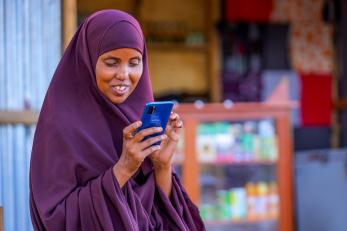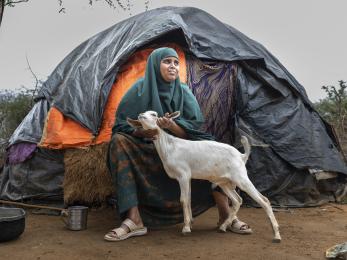Digital Pathways to Economic Opportunities in Kenya’s Northern Rangeland Communities
A SPARC Policy Brief: Evaluating the contribution of Kenya’s Digital Economy Blueprint to economic change in the rangelands

Widespread use of Kenya’s leading mobile money, M-Pesa, and related fintech innovations have made Kenya the world’s leading country in financial inclusivity. Building on these achievements, the government of Kenya instituted progressive policy frameworks like the Digital Economy Blueprint and the National Digital Master Plan to expand Kenya’s digital economy.
The digital inclusion narrative is different in Kenya’s arid and semi-arid lands (ASALs), however, where traditional livelihoods like pastoralism intersect with long-standing structural inequalities. Despite high mobile penetration, digital uptake remains low due to structural constraints such as a lack of infrastructure and identity documentation, low literacy, and weak institutional trust.
In 2024, the Supporting Pastoralism and Agriculture in Recurrent and Protracted Crises (SPARC) research program commissioned a study on the digital economy of Kenya’s northern ASAL counties. This policy brief summarizes findings on the impact of the digital economy on pastoralism and resulting policy implications, with recommendations for equitable benefits and a digital pathway to economic inclusion for pastoralist communities. For the study, SPARC researchers conducted a cross-referential analysis of key policy documents complemented by key informant and expert interviews. Analysis of these policies, programs, and models confirm stakeholder concerns about under-investment and lack of adaptation in dryland counties to meet pastoralist needs and opportunities. Information shared during the expert interviewees re-confirmed that national-level strategies and plans do not sufficiently consider nor address populations residing in the drylands.
Researchers found that while Kenya’s national digital frameworks are visionary, they don’t align with the daily realities of pastoralist life, nomadism, informal economies, and infrastructural isolation. Without this alignment, digital strategies will miss the mark.
Despite this, the spread of information and communication technology (ICT) infrastructure in the rangelands has brought significant benefits. Mobile phones enable pastoralists to connect with others and access global information, receiving instant market information, identifying livestock selling locations, performing quick financial transactions, and participating in livestock insurance schemes. ICT adoption has also facilitated access to information on water status and location. Furthermore, advancements in ICT offer opportunities for increased livestock production, management, and marketing by improving access to markets and price information, reducing financial transaction costs through mobile money transfer services, and enabling cattle traceability using Radio-Frequency Identification (RFID) chips, which helps with monitoring animals, reducing theft risks, and controlling diseases.
Even when considering these benefits, initiatives to drive digital economic transformation continue to face the same constraints symptomatic of the region’s legacy of systemic inequalities. Kenya’s digital success is, therefore, qualified by long-standing structural issues. The largest transformation has been around information flows. Despite this, numerous studies have pointed out that information alone is not sufficient to close the digital gap, and there is a need for accompanying non-digital efforts. Digital tools and processes cannot solve the structural barriers.
Researchers identified four (4) foundational barriers to digital inclusion in the ASALs:
- Infrastructure gaps: While there is 3G/4G coverage in all ASAL counties, network connectivity and electricity access is unreliable in rural areas, making digital participation difficult outside of the main towns.
- Identity and access: Like many other marginalized groups around the world, pastoralists struggle to access official identification documents. Lack of an ID is the second most cited barrier to digital and financial inclusion. In Kenya’s ASAL counties, complex and slow bureaucratic systems delay the issuance of identity cards. Without formal identification, people can’t register a SIM card or mobile money account, or benefit from digital programs.
- Limited digital skills and literacy: Digital skills development efforts have been limited in the ASALs. Even if infrastructure gaps were addressed, effective access to and use of most digital platforms would have limited reach due to low literacy across the region. There is a genuine risk that growth of enhanced digital skills elsewhere could widen the divide between pastoralist communities and the rest of the country if training is not directly relevant to the unique needs of pastoralists, whose priorities often include livestock management, market access, and mobile financial transactions.
- Data governance and trust: In marginalized pastoralist areas, often on the peripheries of the state, concerns about privacy and data rights reign supreme. Concerns about surveillance, especially in cross-border areas, create institutional mistrust. Community data collected through digital finance, livestock tracking, or mapping apps can be used for unintended purposes, including state surveillance or commercial extraction.
Operationalizing Kenya’s Digital Economy Blueprint in the rangelands raises critical questions about equity, local benefit, and unintended exclusion. There is a real concerns] that digital expansion could attract outside actors, displace traditional livelihoods, and deepen existing inequalities if not carefully managed.
While the Blueprint aspires to inclusion and innovation, it risks reinforcing historical power imbalances unless it is adapted to local contexts. Ensuring that the digital economy complements, rather than disrupts, pastoralist systems require grounded, participatory approaches, continuous policy updates, and institutional commitment beyond project cycles.
Kenya’s digital transformation must shift to flexible, co-created systems that incorporate indigenous knowledge and empower pastoralists as active agents of innovation. Technologies like real-time rangeland data, livestock tracking, and mobile-based services can reinforce, not replace, pastoralist resilience if deployed with equity, respect, and partnership at the core.
Based on study findings, SPARC researchers make seven (7) recommendations for a transformational digital economy that includes pastoralist groups:
- Bridge the digital gap in ASAL regions: Address persistent exclusion caused by poor infrastructure, limited device access, and a lack of tailored digital services. Reliable electricity and internet access are foundational to any digital inclusion effort.
- Strengthen digital skills through localized training: Develop culturally relevant audio-visual digital literacy programs that reflect pastoralist realities. Training must build on existing knowledge systems and be accessible to women, youth, and low-literacy populations.
- Secure legal and financial access through identity systems: Fast-track the issuance of national ID cards in pastoralist areas to unlock access to mobile money, digital services, and social protection programs.
- Safeguard community data and build trust: Establish clear data governance frameworks that prioritize community consent, transparency, and protection from misuse or surveillance, particularly in cross-border and high-risk areas.
- Scale up successful innovations and local solutions: Support local innovations such as Index-Based Livestock Insurance (IBLI), climate alert systems, and e-extension services through funding, documentation, and evaluation.
- Promote inclusive policy frameworks and partnerships: National digital policies must recognize and actively include pastoralists as “real-time reliability professionals” leveraging their expertise to co-design adaptive, climate-smart digital ecosystems that strengthen traditional livelihoods rather than replace them.
- Monitor implementation and align with local realities: Establish mechanisms for participatory monitoring of digital policy outcomes in ASAL counties to ensure ongoing learning, accountability, and adaptive course correction.
This material has been funded by UK aid from the UK government; however the views expressed do not necessarily reflect the UK government’s official policies.
Supporting Pastoralism and Agriculture in Recurrent and Protracted Crises (SPARC) aims to generate evidence and address knowledge gaps to build the resilience of millions of pastoralists, agro-pastoralists and farmers in these communities in sub-Saharan Africa and the Middle East. We strive to create impact by using research and evidence to develop knowledge that improves how the UK Foreign, Commonwealth & Development Office (FCDO), donors, non-governmental organisations, local and national governments, and civil society can empower these communities in the context of climate change.
